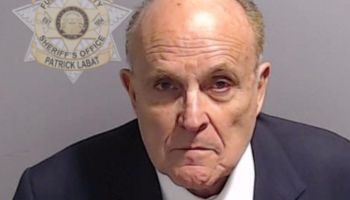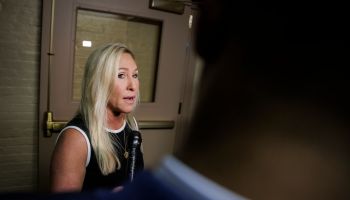Black leadership is dead. There, I said it. We have people in leadership positions, but far too many of them are operating as if it were the 1960s or even the 1980s instead of the twenty-first century.
As I’ve traveled from state to state over the years, I’ve heard folks saying that “we need another Malcolm, we need another Martin,” as if dynamic hip-hop generational leaders like Malia Lazu, Ras Baraka, April Silver, Shani Jamila, and Brian Echols don’t even exist. In fact, I can easily count off 100 such leaders from coast to coast—all of who are doing incredible work in their communities.
We seem to have forgotten the old axiom that all movements are local. Black America has been pining for a national savior since the Civil Rights Movement came to a screeching halt in the 1970s. Apart from our flirtations with Rev. Jesse Jackson and Min. Louis Farrakhan in the 1980s and 90s, we’ve been stuck in the wilderness without any sort of national Black leadership model for forty long and difficult years.
Want to know why large pockets of Black America remain in great despair despite all our amazing post-Civil Rights era advances? Well, look no further than the incredible lack of vision and imagination of our Black leaders—be they elected officials, ministers and imams, public intellectuals, heads of social service organizations, educators, entrepreneurs, or grassroots activists.
Black American leadership has been in a state of arrested development since the days of Fannie Lou Hamer, Ella Baker, the Student Nonviolent Coordinating Committee, Angela Davis, and the Black Panther Party. But some leaders were killed or driven mad by those times, while others wound up in jail or sold out their principles for access to the American dream, for themselves and their immediate circle, rather than for us all. Little wonder, then, that so many of us have pinned our dreams on Barack Obama in 2008. Someone like him was a long time a-coming.
But, no, President Barack Obama is not a Black leader; he is the President of the United States of America. Not the President of Black America, or of hip-hop America, or of young America. Just America. And therein lies the great irony of Mr. Obama being the first Black president in American history. There is this great expectation that President Obama will be that liberator for us, the modern-day Malcolm X-meets-Dr. King, with a swagger that fuses the jazz of John Coltrane and the hip hop of Jay-Z.
But some in Black America have been hard on President Obama for not being, well, Black enough for their taste. Part of the reason for this feeling is the huge void in visionary Black leadership. We’ve been stuck in this vacuum for so long that we expect Mr. Obama to fill it up for us. We expect him to tell it like it is on race and racism, and fulfill all the needs of Black America.
That is not only completely unfair to Mr. Obama, but it speaks of the desperation surrounding our lack of leadership. Many of us are still searching for the sort of leader that has never existed in the White House, or in the statehouse, or in any city’s City Hall.
Meanwhile, we ourselves are scattered, unfocused, and constantly reacting instead of being proactive. We react to the police murders of Sean Bell (New York) and Oscar Grant (the Bay Area), to the Tea Party, Glenn Beck, and Rush Limbaugh, and to gentrification, mass unemployment and mass incarceration, but where are our proactive local and national agendas?
Yes, no doubt racism is alive and well in America. In spite of all its proclamations to the contrary, America has never had the kind of national conversation about race we truly need. This is not a matter of somebody just giving a speech, no matter how eloquent. What we require is something akin to the truth and reconciliation commission established in South Africa after the fall of apartheid.
But what armchair critics of Barack Obama fail to grasp, in historical terms, is that it has always been the people, not the person in the White House, who pushed our nation forward. If there were no abolitionist movement led by the likes of Frederick Douglass, then there would have been no Emancipation Proclamation by President Lincoln. Without A. Phillip Randolph and others threatening a massive protest in Washington, then Franklin Roosevelt would not have banned discrimination within World War II industries. And with no Civil Rights Movement, there would be no Civil Rights Bill in 1964 and no Voting Rights Act in 1965.
Whoever has occupied the White House has always had to face harsh critics. And W.E.B. DuBois, an intellectual giant who lived well into his 90s, was chief among them. But current sideline critics and some of these multimedia hustlers posing as intellectuals ought to study DuBois a bit more closely. Not only was he a scholar, a prolific writer, and a true renaissance man interacting with Black people globally, but he also helped to build institutions that served the people, including the N.A.A.C.P. He didn’t just dog out a sitting president and leave it there.
DuBois understood that talk can be wonderful, but nothing beats action. And that’s the principle behind the N.A.A.C.P. before that organization went adrift. A strong difference of opinion on the best way to deal with racism is what led DuBois out of the N.A.A.C.P. in the mid-1930s. Here’s a small part of his stinging critique:
“Today this organization, which has been great and effective for nearly a quarter of a century, finds itself in a time of crisis and change, without a program, without effective organization, without executive officers who have either the ability or disposition to guide [it] in the right direction.”
Sound familiar?
DuBois was addressing the need for Black institutions of all kinds. Something that is still badly needed in Black America in 2010.
No wonder we are at such a crossroads in Black American history. On the one hand we have groups like the N.A.A.C.P., which seem so spooked by right-wing zealots that they allow a Shirley Sherrod to go down without making sure the people hear the truth, or even listen to her entire speech. On the other end of the spectrum are all the Barack-haters, folks who never seem to miss an opportunity to verbally assault the President every chance they get. That would include certain motor-mouth Black Ph.D.s, and the sort of media pundits who have much to say about the Black community, but who are rarely ever seen in any Black community except when it’s time for a drive-by photo opportunity.
All this noise makes for great headlines and television ratings, but does absolutely nothing to empower Black America.
It really is a sad joke. Doubly sad when you consider the many challenges we face, including the HIV/AIDS pandemic, nonstop violence in all forms, serious health problems like diabetes, high blood pressure, and obesity, and the lack of respect afforded to both our elders and our youth.
Black leadership will continue to be dead if we waste our time heaving hate at Barack Obama, or waiting for him to solve all our problems. We ourselves must rise to meet the challenge. The question is what are you doing, in your local community, on a consistent basis, to build or support institutions that help our people to help themselves?
My job as a leader, and your job, too—if you care enough—is to support true visionary leaders. Folks like Charlie Braxton in Jackson, Mississippi—a handicapped Black man who works day to day, thanklessly and often anonymously, with and for the people. I have seen Charlie bring feuding gang members together, mentor all kinds of young people, create one business after another, and serve as a beacon of light for a community where so many other lights are dimmed.
That is the new model of Black leadership in the twenty-first century: build or maintain institutions that provide direct service, resources, and information to our communities; change, once and for all, how we discuss the many challenges facing our people; and be on the front lines with the people as much as possible.
When we can do that—and identify and support more who do—then we in Black America will have a real shot of getting out of this wilderness. But if we do not, then it will be another long 40 years looking for a Moses who may never come.
Kevin Powell is writer, activist, author of 10 books, and most recently a Democratic candidate for the United States Congress in Brooklyn, New York. He can be reached at kevin@kevinpowell.net
RELATED STORIES
Black Leaders Must “Stop Ghetto Dictatorships”
Congressman Ed Towns’ Lazy Leadership
Share this post on Facebook! CLICK HERE:
Nick Cannon invites MC Hammer to Tag Team wrestle Eminem & Jay-Z [from TheUrbanDaily.com]
Wayne Brady and Mike Tyson remake Bobby Brown’s “Every Little Step” video [from TheUrbandaily.com]
Tyrese puts Kim Kardashian on blast for not supporting Lala’s reality show [from HelloBeautiful.com]
Oprah reunited Terry McMillian and gay ex-husband [from Hellobeautiful.com]
Rihanna and Drake get cozy at after-party [from Hellobeautiful.com]















